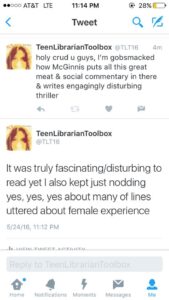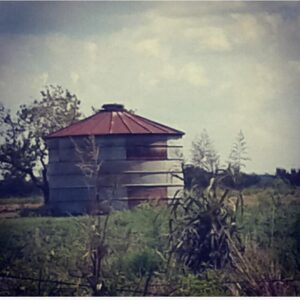Rural Poverty and THE FEMALE OF THE SPECIES by Mindy McGinnis
Sometimes, it is indeed a small world after all. Shortly after moving to Texas, I learned that author Mindy McGinnis lived just 10 minutes from the very library I had spent the last 10 years working at in the state of Ohio. This town was my home, the place where my children were born. It was also, at the time, the county with the highest poverty rate in all of Ohio. So while there were many aspects about Mindy McGinnis’ THE FEMALE OF THE SPECIES that stood out to me, one that stood out most vividly is the depiction of rural poverty. THE FEMALE OF THE SPECIES is set in a small, Midwestern town that is ravished by poverty and in my mind’s eye I could picture the very places around this small town that I thought Mindy might be talking about. And while all poverty is bad, each type of poverty has its unique challenges. For example, one of the greatest challenges in rural poverty is transportation. Rural communities are often spread out and don’t have public transportation systems, which makes things like going to a grocery story or doctor’s appointment quite challenging. There are usually fewer options in rural communities, and less options means less competition and less price choices.
Although I currently live in Texas, I work in a public library in another rural Ohio community that is also fighting high poverty. Many of my patrons don’t have the money to buy current technology, and even if they did have the money the truth is, there are still parts of my community that have no providers offering wireless or DSL Internet. Like many other places experiences high rural poverty rates, drug use and drug related deaths are reaching epidemic proportions. So as I mentioned, THE FEMALE OF THE SPECIES resonated with me in ways that I can not even begin to describe.
ADVERTISEMENT
ADVERTISEMENT
Today, I am honored to host author Mindy McGinni who talks about rural poverty and the part it plays in her newest release, THE FEMALE OF THE SPECIES.
The Female of the Species addresses many issues within its pages; rape culture and vigilante justice being the most prevalent. A quieter issue raises it’s head though, one that is easy to overlook, shadowed as it is by the more controversial topics.
Rural poverty. Much of the time poverty is associated with urban life and that is certainly a truth that cannot go ignored. However, there is another face to poverty, one that looks picturesque. Farms with collapsed barns. Homes where no one lives anymore.
Much of the time poverty is associated with urban life and that is certainly a truth that cannot go ignored. However, there is another face to poverty, one that looks picturesque. Farms with collapsed barns. Homes where no one lives anymore.
I was born and raised in a rurally impoverished area and now I live and work in one. For fourteen years I have been employed as a library aide at a local school where nearly forty percent of our student body receive free and reduced lunch.
During deer hunting season our attendance list shows double digits of our students are excused for the day to participate… and in most cases it’s not a leisure activity for them. They’re putting much-needed food on the family table.
Food pantry lines are long, faces are pinched, and during the summer months many of our students go without lunch because they depended on the school to provide it. Because it is a sprawling, rural community, people who have to weigh the cost of gas for the drive to the pantry against the food they will get there.
None of the characters in my book suffer the indignity of hunger, because I feel it’s an issue that deserves more space than there was room for within this particular story. But hunger breeds a specific type of desperation that calls for an escape, and this can open the door to darker things.
Upper and middle classes know the need for a vacation. We all feel the cycle of our daily lives triggering stress, causing irritation and anger, and even pushing us towards exhaustion. So we take a “mental health day,” call off work for little or no reason, or we cash in those vacation days and just “get away from it all.”
We have that luxury.
Many of the jobs available to the working poor pay by the hour, and to take a day off means to take a pay cut – one that the budget doesn’t allow for. Vacation time may be possible, but the idea of affording to actually leave is laughable. Escapes from reality are sometimes sought not in a getaway, but in drug use.
There is a major heroin epidemic in my area. We have lost students in my small school district to it. One Twitter user already thanked me for mentioning the epidemic in The Female of the Species, saying that she hopes it may draw more attention to the issue. If it doesn’t, this should; last weekend alone multiple people OD’d, two of them in a mini-van with a four year old.
It’s easy to point fingers, lay blame, criticize and judge. What kind of people do this?
The desperate. The addicted. The hopeless.
Such descriptions aren’t solely the realm of the poor, but there are correlations that can’t be denied.
On my worst days – and we all have bad ones, no matter who we are – I can get upset, feel like giving up or just ducking out of reality for awhile. Stress is present in all our lives, no matter our socioeconomic standing.
But on these days I remind myself that I have food. I have clothes. I have a working car that I can drive to my next school visit, library appearance, or book club talk. I can fill the gas tank and go to work without having to worry about paying for that stop.
The small luxuries of our lives are something that most of us take for granted until they are taken away from us – a cracked phone that doesn’t work, the car being in this shop for a few days, the heat and electric always being on.
When you do have one of those days, think about those who can’t afford a phone at all, and are literally holding their cars together with duct tape. In the past I’ve had students that heat their home with the kitchen stove, and the children sleep with the pets to share body heat.
Spare a thought for them on your bad days, and if you can spare more than that, please do.
Publisher’s Book Description
Alex Craft knows how to kill someone. And she doesn’t feel bad about it. When her older sister, Anna, was murdered three years ago and the killer walked free, Alex uncaged the language she knows best. The language of violence.
ADVERTISEMENT
ADVERTISEMENT
While her crime goes unpunished, Alex knows she can’t be trusted among other people, even in her small hometown. She relegates herself to the shadows, a girl who goes unseen in plain sight, unremarkable in the high school hallways.
But Jack Fisher sees her. He’s the guy all other guys want to be: the star athlete gunning for valedictorian with the prom queen on his arm. Guilt over the role he played the night Anna’s body was discovered hasn’t let him forget Alex over the years, and now her green eyes amid a constellation of freckles have his attention. He doesn’t want to only see Alex Craft; he wants to know her.
So does Peekay, the preacher’s kid, a girl whose identity is entangled with her dad’s job, though that does not stop her from knowing the taste of beer or missing the touch of her ex-boyfriend. When Peekay and Alex start working together at the animal shelter, a friendship forms and Alex’s protective nature extends to more than just the dogs and cats they care for.
Circumstances bring Alex, Jack, and Peekay together as their senior year unfolds. While partying one night, Alex’s darker nature breaks out, setting the teens on a collision course that will change their lives forever. (Katherine Tegen Books, September 2016)
More on Rural Poverty and America’s Rural Drug Crisis
Understanding the Epidemic | Drug Overdose | CDC Injury Center
Opioid Addiction 2016 Facts & Figures
5 Charts That Show How Bad America’s Drug Problem Is | TIME
Why the Left Isn’t Talking About Rural American Poverty – Rural America
Child Poverty Higher and More Persistent in Rural America
Who’s Afraid of Rural Poverty? The Story Behind America’s Invisible
Hunger and Poverty
- Can We All Just Stop Saying the Internet Is Free Now Please?
- Rich Teen, Poor Teen: Books that depict teens living in poverty
- Working with youth who live in poverty
- Sunday Reflections: This is what losing everything looks like
- Sunday Reflections: Going to bed hungry
- Sunday Reflections: A tale of two libraries
- Sunday Reflections: Are schools disriminating against the poor?
- Sunday Reflections: Poverty doesn’t always look the way you think it does
- Sunday Reflections: All I Want for Christmas is the Chance to Go to College
- Feeding Teens at the Library: Summer and Afterschool Meals
- The Economy as Villain in The Year of Shadows by Claire LeGrand
- Book Review: PANIC by Lauren Oliver
- Book Review: HUNGRY by H. A. Swain
- Not All Educations Are Created Equal
- Teens and Poverty: PBS Newshour Discusses Being Homeless and Trying to Graduate High School
- Sunday Reflections: Dasani, Poverty, and Education (by Robin)
- Sunday Reflections: Torchwood Children of Earth, a reflection on how we think about children in poverty among us
- Teens and Poverty: An updated book list
- Sunday Reflections: Becoming a Statistic
- Impoverished Youth: More Than Have of America’s Public School Children Now Live in Poverty
- Teen Homelessness and NO PARKING AT THE END TIME by Brian Bliss
Additional Sources:
Social Mobility:
Cycles of Poverty:
- Breaking the Cycles of Poverty in Young Families
- Cycle of Poverty Hard to Break in Poorest U.S. City
- The Cycle of Poverty and Poor Health
How Poverty Affects Schools:
Karen’s Thoughts on THE FEMALE OF THE SPECIES: Highly Recommended



 More From Mindy McGinnis
More From Mindy McGinnis
Filed under: #SVYALit, Teen Issues, Teens and Poverty
About Karen Jensen, MLS
Karen Jensen has been a Teen Services Librarian for almost 30 years. She created TLT in 2011 and is the co-editor of The Whole Library Handbook: Teen Services with Heather Booth (ALA Editions, 2014).
ADVERTISEMENT
ADVERTISEMENT
SLJ Blog Network
The Moral Dilemma of THE MONSTER AT THE END OF THIS BOOK
Cover Reveal and Q&A: The One and Only Googoosh with Azadeh Westergaard
K is in Trouble | Review
Parsing Religion in Public Schools
ADVERTISEMENT









